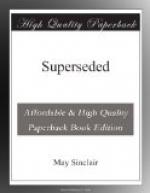Her eyes left him suddenly and wandered about the room. She was full of little tremors and agitations; she wished that the towels wouldn’t look so much like dish-cloths; she credited him with powers of microscopic observation, and wondered if he had noticed the stain on the carpet and the dust on the book-shelves, and if he would be likely to mistake the quinine tabloids for vulgar liver pills, or her bottle of hair-wash for hair-dye. Once released from its unnatural labours, her mind returned instinctively to the trivial as to its home. She glanced at her hat, perched conspicuously on the knob of the looking-glass, and a dim sense of its imperfections came over her and vanished as it came. Then she tried to compose herself for the verdict.
It did not come all at once. First of all he asked her a great many questions about herself and her family, whereupon she gave him a complete pathological story of the Moons and Quinceys. And all the time he looked so hard at her that it was quite embarrassing. His eyes seemed to be taking her in (no other eyes had ever performed that act of hospitality for Miss Quincey). He pulled out a little book from his pocket and made notes of everything she said; Miss Quincey’s biography was written in that little book (you may be sure nobody else had ever thought of writing it). And when he had finished the biography he talked to her about her work (nobody else had ever been the least interested in Miss Quincey’s work). Then Miss Quincey sat up in bed and became lyrical as she described the delirious joy of decimals—recurring decimals—and the rapture of cube-root. She herself had never got farther than cube-root; but it was enough. Beyond that, she hinted, lay the infinite. And Dr. Cautley laughed at her defence of the noble science. Oh yes, he could understand its fascination, its irresistible appeal to the emotions; he only wished to remind her that it was the most debilitating study in the world. He refused to commit himself to any opinion as to the original strength and magnitude of Miss Quincey’s brain; he could only assure her that the most powerful intellect in the world would break down if you kept it perpetually doing sums in arithmetic. It was the monotony of the thing, you see; year after year Miss Quincey had been ploughing up the same little patch of brain. No, certainly not—she mustn’t think of going back to St. Sidwell’s for another three months.
Three months! Impossible! It was a whole term.
Dr. Cautley scowled horribly and said that if she was ever to be fit for cube-root and decimals again, she positively and absolutely must. Whereupon Miss Quincey gave way to emotion.




